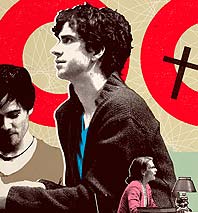
After the t-shirts and beer labels, the hagiographic movies and silly rhymes (“I’m like Che Guevara with bling on,” raps Jay-Z), Ernesto Guevara de la Serna wants to straighten a few things out. José Rivera’s School of the Americas (co-produced by the LAByrinth, at the Public) traces the last two days of the Argentine revolutionary’s life. The story comes from historical fact: When a feckless attempt to start an insurrection in Bolivia led to his capture, Che (played here by John Ortiz) really was held for two days in tiny La Higuera while authorities decided his fate, and really did talk to a young villager named Julia Cortes (an inadequate Patricia Velasquez). As imagined by Rivera, their conversations are sometimes predictable—America is “the greatest enemy of mankind”—but also contain surprising introspection. Che calls himself “a goddamn joke” and “a small, failed, stupid man.” No doubt addressing the audience, he declares, “Worship the struggle … don’t worship me.”
If the play could detach the actual man from his romantic legend, Rivera—who wrote the screenplay for The Motorcycle Diaries—would be doing a real public service. His Che argues passionately for social justice, particularly the need for education. But though he speaks frankly about his bloody deeds as a soldier, he skims over his bloody deeds as an apparatchik—the executions, collectivization, and labor camps that followed his march into Havana with Castro. The play’s not a total whitewash: Felix Rodrigues (a magnetic Felix Solis), a Cuban among his captors, says that Che “raped my country” and destroyed everything beautiful in it. Still, it’s too neat to show us Che at a sympathetic moment, soft-pedal his repressive brutality, and invite us to be inspired by his humanity. That the invitation is accepted so readily might say less about Che than it does about our own beleaguered liberalism. Burdened with Hillary, Kerry, and the uninspiring rest, we embrace someone whose fervency seems a proof of his virtue, no matter how dire the consequences. “Unhappy is the land that has no hero,” says a character in Brecht’s Galileo, a tougher, fairer, fuller look at a flawed revolutionary. “Unhappy is the land that needs a hero,” the astronomer replies.
“I want my windows free of stain,” says Hannah, a character in The Busy World Is Hushed. “I want a clear view of God.” Who doesn’t? Keith Bunin may not unearth any new mysteries in this play, which just concluded a run at Playwrights Horizons, but his story of three people wrestling with God, the absence of God, and each other stuck with me long after I saw it.
The Bible may be, as Hannah puts it, “a self-contradictory, haphazardly edited compilation,” but Bunin’s script is neatly schematic. Brandt (Hamish Linklater) wants to assist Hannah (Jill Clayburgh), an academic and Episcopal priest, in her study of a newly discovered Gospel, in part because his father is dying of a brain tumor. Meanwhile, Hannah’s son Thomas (Luke Macfarlane) returns from one of his many self-destructive adventures, seeking clues about his own dad—a possible suicide—by scouring the Bibles he left behind. In their disparate ways, all three of them are seeking a truer relationship with the loving wisdom of a father, or the Father.
The trap of material like this is that it’ll descend into a shouty theology seminar. Mark Brokaw’s production avoids this fate until deep into Act Two, when strained writing and wobbly acting hobble the play. (Macfarlane is outclassed by his fine castmates, particularly the wonderfully fluid Linklater.) Still, Bunin does a mostly sensitive job tracing how these lonely people can prop up or wound one another, and implies that if they’re going to find God, they’ll have to wring Him out of their relationships with one another. Absolutely, hell is other people, Bunin seems to say—but not only hell.
School of the Americas
By José Rivera. Public Theater. Through July 23.